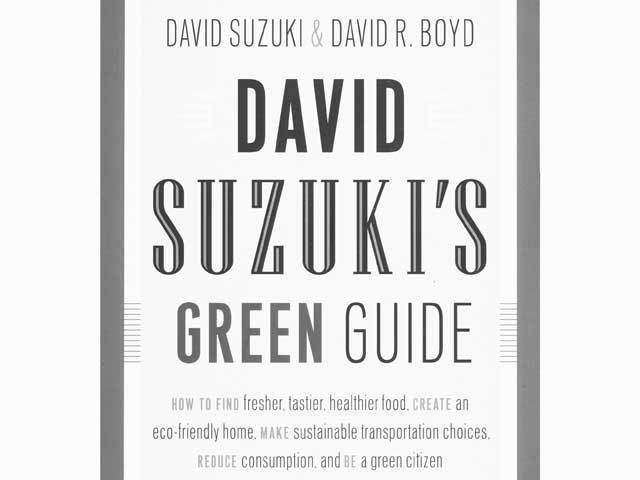David Suzuki’s Green Guide
By David Suzuki & David R. Boyd
Greystone Books
192 pages, $19.95
The concept of “going green” and becoming more ecologically friendly seems to be quite a daunting task. Each and every day, North Americans are guilt-tripped about our wasteful lifestyle (rightfully so), and pressured into making meaningful changes to help slow the rate at which society is ravaging the natural world.
Buzzwords like “sustainability” abound in the media — locally, nationally and internationally — and particularly here in British Columbia. Surrounded by the mountains, ocean and forests, environmental issues have become a hot-button topic for politicians.
But all the eco-friendly rhetoric and scientific information bandied about by elected representatives and reported in newspapers and on television is enough to leave you slightly stupefied. (Bullshit baffles brains, right?) It’s hard not to feel helpless when confronted with issues of climate change, conservation, depletion of natural resources, land degradation, overpopulation, air pollution, and ozone depletion.
While I’m admittedly not the most eco-friendly person out there (I drive a car and eat meat), I also despise litterbugs, take quick showers, turn off lights when I leave a room, and put on a sweater when it’s cold, instead of cranking up the heat. I believe making minor changes to the way we live can result in meaningful change, so I’m always interested in hearing new, simple ways to tweak my day-to-day routine for the better. Enter Canada’s favourite eco-guru, David Suzuki, and his newest book, which he wrote with David R. Boyd, a leading environmental lawyer and author.
David Suzuki’s Green Guide hit bookshelves in early September, and this compact soft-cover gem is jam-packed with info on climate change and other current environmental issues. But, more importantly, it offers lots of simple tips on how to become a greener citizen.
Personally, I like the authors’ no-nonsense approach and courage of conviction — they don’t mince words or waste time debating the reality of global warming.
“This book cuts through the fog, identifying the most important actions we can take and how to get started. Knowledge plus motivation equals action.”
While some of the authors’ recommendations entail making an upfront investment — like replacing old appliances with new, energy-efficient models — most are no-cost suggestions, like using pots and pans with tight-fitting lids, defrosting food in the fridge and not the microwave or under running water, and cleaning the lint trap before using the dryer.
Sure, some of the suggestions are pretty obvious (it’s common sense to keep the fridge and oven door closed as much as possible, right?), but there are definitely a few more obscure tidbits scattered throughout. For example, I didn’t know that in Canada, more than one in three households has two refrigerators, and that some utility companies in North America will pick up your old fridge, recycle it, reduce your energy bill by about $100 per year, and maybe even send you a cheque.
Most of the tips and ideas are pretty simple, and the authors include very detailed instructions on how you can make the necessary changes. For example, after explaining the environmental and financial costs associated with water heating, and advising readers to simply turn down the temperature on their hot water tanks, they go one step further, and actually spell out the steps involved for adjusting electric and gas heaters. No wiggle room for readers to make excuses.
They also provide current websites for the U.S., Canada, Australia and the U.K., so nationally relevant information is readily accessible. Just in case you want to learn more, or find out more about a certain issue, the book includes a chapter-by-chapter breakdown of resources (other books, websites and videos), plus a detailed index.
David Suzuki’s Green Guide isn’t an intimidating tome, riddled with statistics and scientific jargon. It’s user-friendly, easy to read and understand, written in a conversational tone, and a valuable, practical resource for the socially and environmentally conscious citizen.
Finally — and quite significantly, in my opinion — you don’t have to worry about this book bringing you down with a doomsday message. I don’t know about you, but I’m pretty tired of fear-mongering environmental messages. Instead, this guide is full of hopeful anecdotes, messages and quotes to help inspire readers to actually integrate some of the suggested actions into our lives.
“A sustainable future lies within the reach of our imaginations. Imagine a vehicle whose only waste product is water (we’re not referring to a bicycle and your sweat). Imagine getting a check from a utility company every month instead of a bill, because your home generates more electricity than it consumes… Does this description of the future sound like a dream, or a science fiction version of ecological utopia? Perhaps, but it’s not.”




